Overview
Navigating the executive job market in 2025 requires a keen understanding of pivotal trends, including:
- Digital transformation
- The increasing demand for diversity and inclusion
- The significance of personal branding and networking
Successful job seekers must leverage these trends by committing to:
- Continuous learning
- Optimizing their online presence
- Engaging effectively with recruitment firms
These strategies enhance visibility and secure desirable opportunities. Are you prepared to adapt to these evolving dynamics? Embrace these insights to position yourself advantageously in a competitive landscape.
Key Highlights:
- Digital transformation is reshaping leadership roles, requiring executives to leverage AI and automation for operational efficiency.
- Remote work has led to a demand for flexibility and work-life balance in job evaluations, necessitating strategic leadership approaches.
- Organizations are prioritizing diversity and inclusion, seeking leaders who can foster inclusive workplaces and cultural competence.
- Salary transparency is increasing; leaders must negotiate effectively and understand market rates to articulate their value.
- Personal branding is crucial; executives should define their unique value, optimize online presence, and engage in thought leadership.
- Networking is vital; maintaining relationships and attending industry events can significantly enhance job opportunities.
- Job seekers should research recruitment firms, build relationships with recruiters, and communicate their professional objectives clearly.
- Continuous learning is essential for staying relevant; enrolling in courses and seeking mentorship can enhance professional advancement.
- Resilience during job searching can be maintained by setting realistic goals, practicing self-care, and seeking support from peers.
Introduction
The executive job market in 2025 is evolving at a rapid pace, driven by technological advancements, shifting workplace dynamics, and a growing emphasis on diversity and inclusion. As organizations grapple with a fierce talent war, executives must navigate a landscape that demands not only adaptability but also strategic foresight. From harnessing the power of digital transformation to embracing flexible work models, leaders are now tasked with redefining traditional roles while ensuring they attract and retain top talent.
What does this mean for those at the helm? The answer lies in essential strategies that will empower executives to thrive in this competitive environment. Personal branding, networking, and continuous learning emerge as key components for success. By investing in these areas, leaders can position themselves not just as participants in the job market but as frontrunners who shape its future. This article delves into these insights, underscoring the importance of proactive engagement in a rapidly changing landscape.
Understanding the Executive Job Market Landscape
Navigating the leadership job market in 2025 demands a keen understanding of the dynamic landscape shaped by several key trends, particularly in the context of the ongoing talent war and the necessity for personalized recruitment strategies.
-
Digital Transformation: The integration of AI and automation is fundamentally altering leadership roles. Leaders must not only embrace these technologies but also leverage them to enhance operational efficiency and drive innovation. As organizations increasingly adopt AI-driven tools for recruitment and performance evaluation, leaders are expected to guide initiatives that prioritize upskilling and ethical considerations in technology use. This underscores the importance of a seamless interview process, as candidates are assessing potential employers just as closely as they themselves are being evaluated. Hiring managers must ensure that the interview process is handled efficiently to avoid losing top talent.
-
Remote Work: The shift towards hybrid work models has become a defining characteristic of the corporate environment. Executives must evaluate job opportunities through the lens of flexibility and work-life balance, as companies adapt to the preferences of a workforce that values remote options. This trend necessitates a strategic approach to leadership that fosters collaboration across diverse work settings and highlights the need for organizations to connect with top talent effectively.
-
Diversity and Inclusion: There is a growing emphasis on cultivating diverse leadership teams. Organizations are actively seeking candidates who can demonstrate cultural competence and a commitment to fostering inclusive workplaces. Leaders are expected to champion diversity initiatives, ensuring that their teams reflect a wide range of perspectives and experiences, which can be a key factor in attracting high-quality candidates.
-
Salary Transparency: With increasing openness around salary discussions, leaders must be prepared to negotiate effectively. Understanding market rates and being able to articulate one’s value proposition is essential in this evolving landscape. Candidates should approach salary negotiations with confidence, backed by data and a clear understanding of their contributions. This is especially pertinent in a period when personalized recruitment services, such as those provided by Boutique Recruiting, can link validated candidates for onsite and remote opportunities with high conversion rates of 88%.
By remaining aware of these trends and employing expert services, job seekers can strategically position themselves in the competitive job market, enhancing their chances for success. Additionally, personalized professional coaching, comprehensive networking and job placement support, expert application and interview preparation, and essential professional development skills are available to candidates navigating this landscape. Boutique Recruiting operates across the U.S. and Canada, and as Eric Eddy from CPA Resources Global Professionals notes, the firm’s ability to deliver top-notch candidates quickly and efficiently underscores the value of tailored recruitment services that Boutique Recruiting provides.
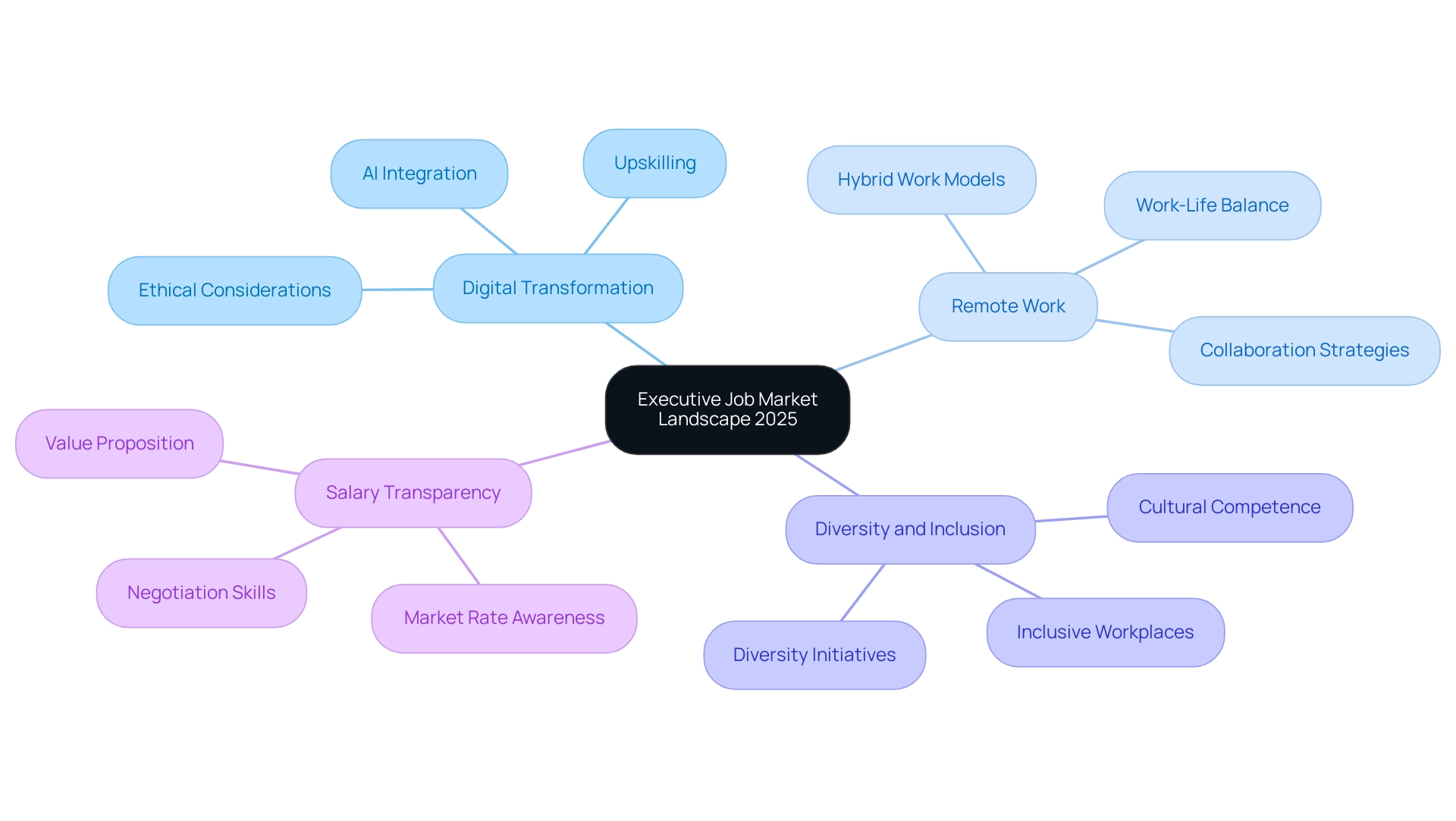
The Power of Personal Branding in Your Job Search
In the competitive landscape of 2025, personal branding stands as a pivotal element for professionals striving to advance their careers. Consider these essential steps to elevate your personal brand:
-
Define Your Brand: Start by identifying your unique value proposition. This entails a comprehensive evaluation of your skills, experiences, and leadership style, which collectively define your professional identity.
-
Optimize Your Online Presence: Ensure your LinkedIn profile and other professional platforms accurately reflect your brand. Notably, 90% of employees assert that active leadership on social media enhances brand image. Thus, it is imperative that your online presence remains polished and professional.
-
Engage in Thought Leadership: Establish yourself as an industry expert by disseminating relevant insights and articles. This approach not only highlights your knowledge but also cultivates credibility within your field.
-
Network Strategically: Build connections with industry leaders and participate in discussions that align with your brand. Remember, networking is not merely about quantity; the quality of your connections can profoundly impact your professional trajectory. In fact, leads generated through employee networks convert seven times more frequently than other leads, underscoring the significance of strategic relationships and their role in enhancing your visibility in leadership positions.
-
Seek Feedback: Consistently request input from peers and mentors to refine your brand. This feedback loop is vital for ensuring that your personal brand remains in sync with your evolving career aspirations and industry standards.
Moreover, research indicates that enjoyment fosters engagement and productivity in the workplace. Companies that prioritize a fun environment are likely to experience heightened engagement, which can positively affect personal branding efforts. By cultivating a positive work atmosphere, leaders can further amplify their attractiveness to prospective employers.
By focusing on these strategies, leaders can adeptly navigate the job market, boosting their visibility and appeal to potential employers. As Mo Shehu, Founder and CEO of Column Content, aptly states, “The leaders shaping industries tomorrow are the ones making themselves visible today.” This proactive approach to personal branding is indispensable for success in today’s dynamic professional landscape.
Furthermore, Boutique Recruiting’s impressive track record as a trusted recruiting partner reinforces the significance of these strategies in a competitive job market.
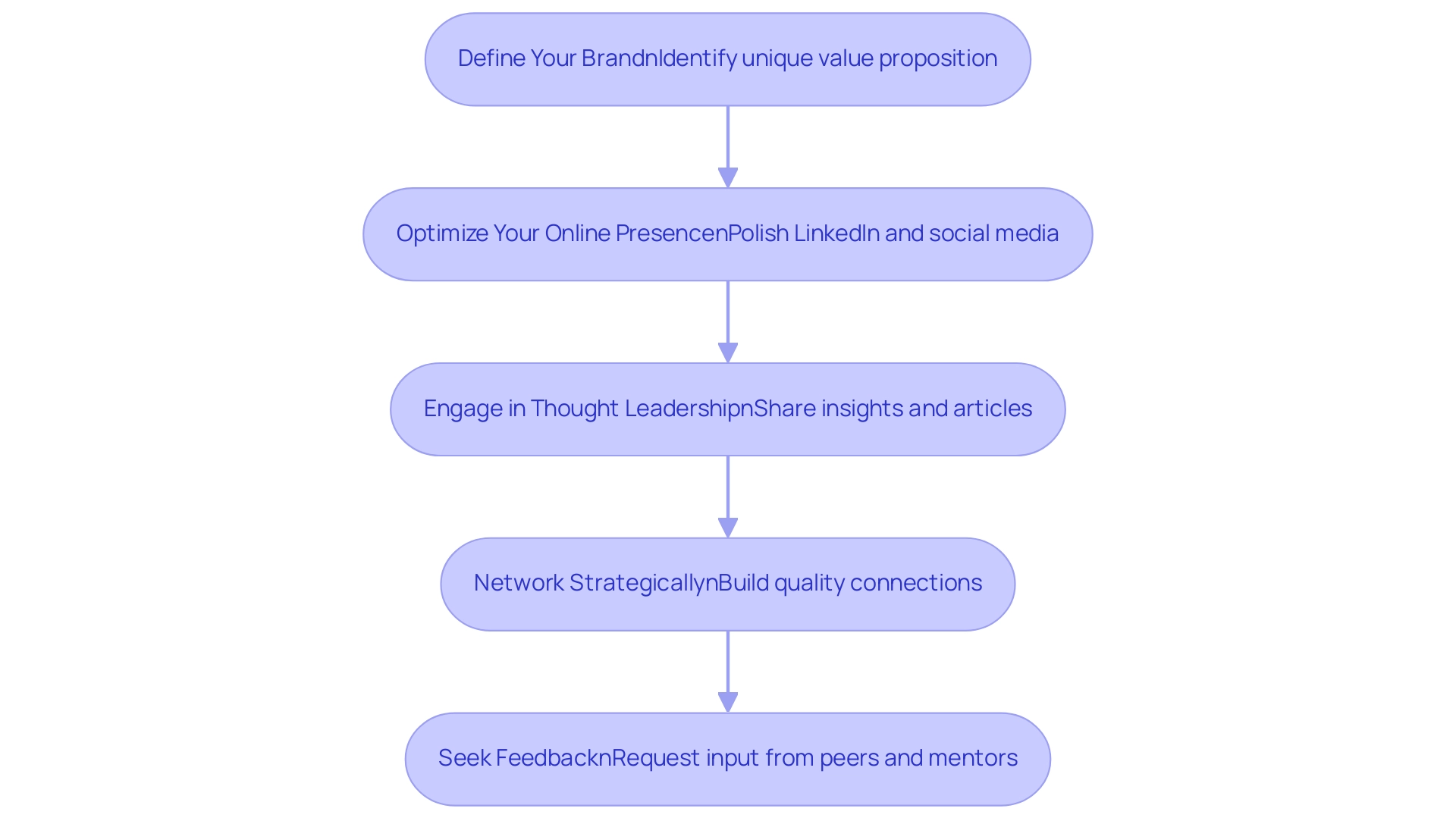
Leveraging Your Network: Strategies for Executive Job Seekers
To leverage your network effectively in the executive job market, particularly for high-demand finance and technology roles such as CFOs, Financial Managers, and Chief Technology Officers, consider implementing the following strategies:
- Identify Key Contacts: Compile a list of influential individuals within your network who can offer valuable insights or referrals. Focus on those who have connections in your target industry, especially in organizations where Boutique Recruiting specializes in tailored recruitment solutions.
- Engage Regularly: Maintain consistent communication with your contacts through emails, social media interactions, or in-person meetings. Regular engagement helps keep you top-of-mind and fosters stronger relationships. Notably, 43% of millennials find it difficult to keep in touch with their connections, underscoring the importance of proactive engagement.
- Attend Industry Events: Actively participate in conferences, webinars, and networking events tailored to your field. These gatherings provide executive job seekers with opportunities to meet new professionals and expand their network, particularly in sectors where Boutique Recruiting operates, thereby enhancing their chances of finding the right opportunities.
- Offer Value: Contribute to your network by sharing relevant information, resources, or insights. This approach not only builds goodwill but also encourages reciprocity, making others more inclined to assist you in your job hunt, especially when seeking specialized roles in finance or technology.
- Follow Up: After meeting someone new, promptly send a follow-up message to reinforce the connection. Express your interest in staying in touch and highlight any shared interests or discussions from your meeting.
As Brian Fink, a recruiter and commentator, states, “A strong referral can catapult your resume past the black hole of the ATS and land it directly on a decision-maker’s desk.” This highlights the significance of referrals in your job hunt. Furthermore, Boutique Recruiting distinguishes itself by concentrating on establishing enduring connections and comprehending company culture, which can lead to successful job placements through their tailored efforts across various sectors in the U.S. and Canada.
By prioritizing meaningful connections and strategically engaging with your network, an executive job seeker can enhance their professional job hunt and significantly increase their chances of securing desirable opportunities.
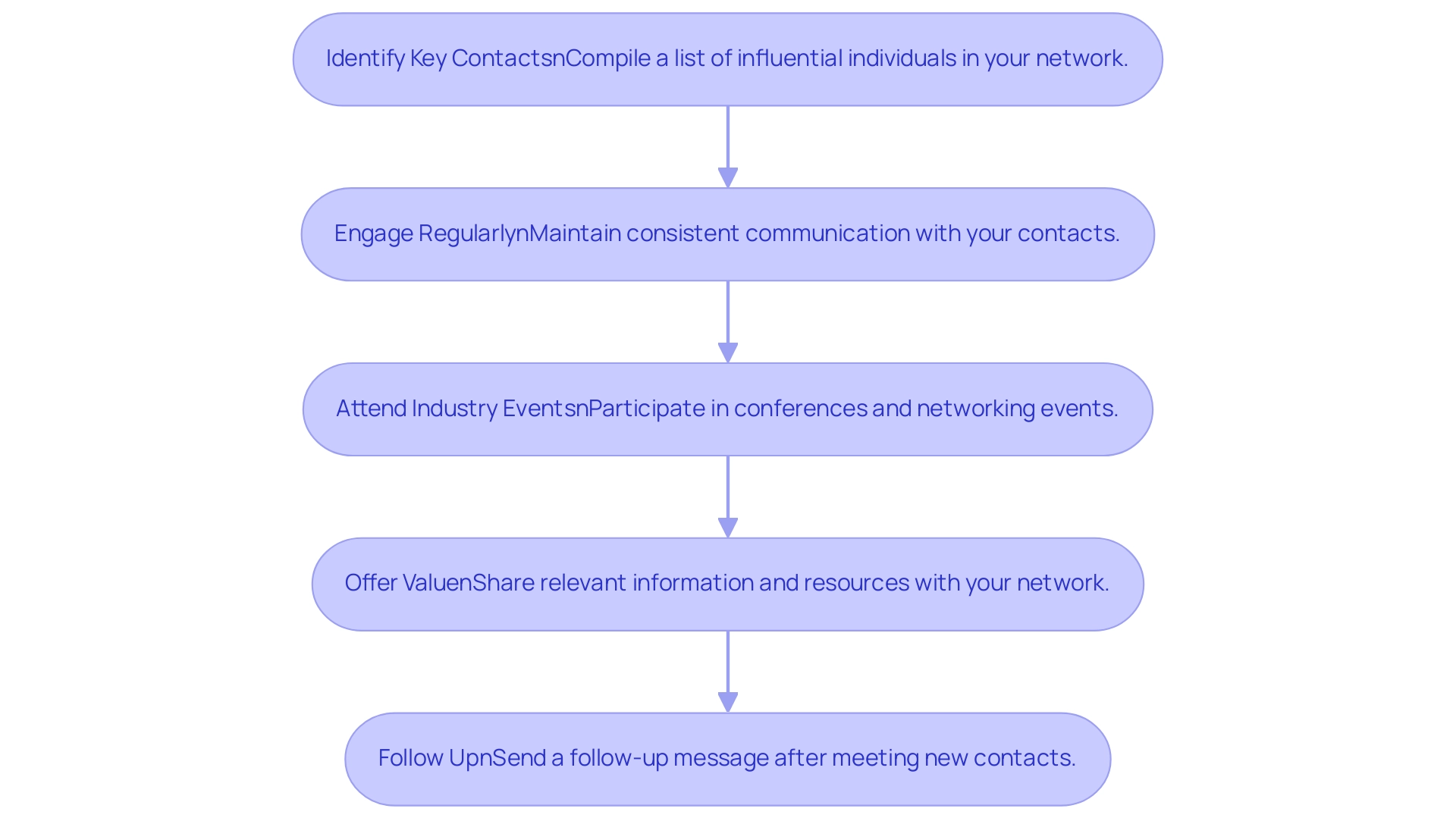
Navigating Executive Search Firms: What You Need to Know
When interacting with recruitment firms, it is essential to consider the following crucial strategies to enhance your job hunt and align with your professional objectives:
-
Research Firms: Begin by identifying firms that specialize in assisting executive job seekers within your industry. Understanding their client base and the sectors they serve will enable you to find the right match for your aspirations, ensuring that you explore all available options.
-
Build Relationships: Establishing rapport with recruiters is vital. Proactively reach out to express your interest in potential opportunities, demonstrating your enthusiasm and commitment to your professional journey. A company that values its candidates will support you throughout this process, recognizing its significance.
-
Be Prepared: Ensure that your resume and personal branding materials are polished and ready for discussion. A well-prepared presentation of your skills and experiences can significantly impact the impression you make, allowing you to communicate your unique value clearly.
-
Communicate Clearly: Articulate your professional objectives and the unique value you bring to potential employers. Effective communication is key to ensuring that recruiters understand your aspirations and can match you with suitable roles that challenge your professional growth.
-
Follow Up: After your initial conversations, maintain regular contact with recruiters. This not only keeps you on their radar for future opportunities but also reinforces your interest and professionalism.
-
Consider All Offers: Exercise caution in committing too quickly to a job offer, as doing so may lead to regret. The first offer may not be the best one available. Taking the time to investigate various job proposals can uncover surprising advantages and opportunities that align better with your long-term professional objectives.
Interacting with recruitment firms can yield substantial benefits for an executive job seeker during their job hunt. Statistics indicate that organizations employing recruitment agencies often experience higher retention rates among hired leaders, underscoring the importance of strategic hiring. By viewing your involvement with these firms as a partnership, you can enhance your chances of discovering a position that aligns with your skills and professional objectives.
Remember, the right job offer should not only meet your immediate needs but also align with your long-term aspirations, ensuring that you make a well-informed decision.
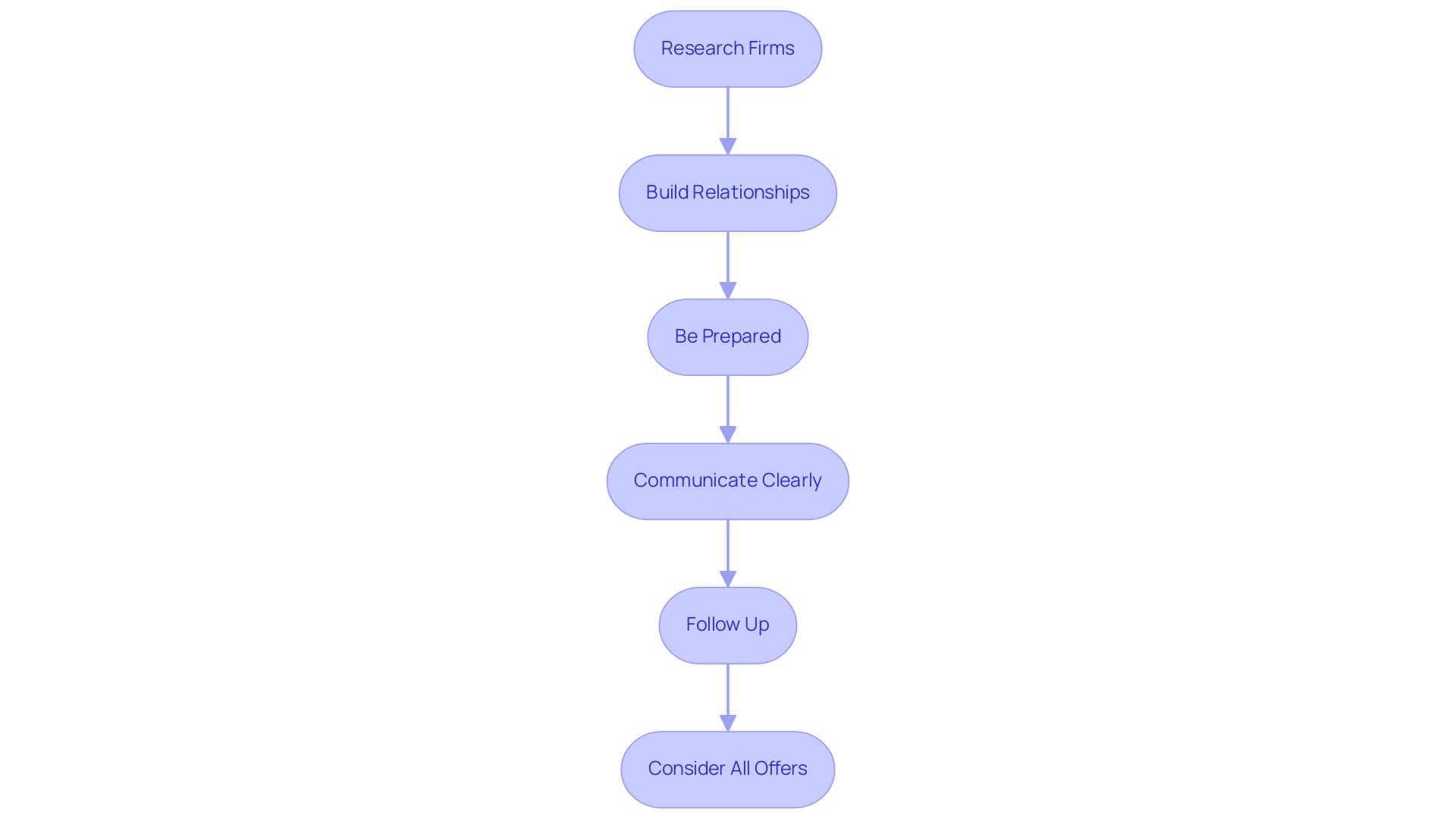
Essential Steps for a Successful Executive Job Search
To conduct a successful professional job search in 2025, it is crucial to follow these essential steps:
-
Self-Assessment: Begin by reflecting on your career goals, strengths, and areas for improvement. This introspection is vital; studies indicate that candidates who engage in thorough self-assessment are 50% more likely to secure interviews. Utilize self-assessment techniques such as personality tests and skills inventories to gain clarity on your professional identity.
-
Resume Optimization: Tailor your resume to highlight relevant achievements and skills that align with the roles you are targeting. In 2025, the emphasis on personalization is paramount; resumes that incorporate industry-specific language and quantifiable results significantly increase the chances of catching a hiring manager’s attention. Remember, a well-optimized resume can lead to a 40% higher response rate from recruiters.
-
Interview Preparation: Prepare for common leadership interview questions and develop a compelling narrative that showcases your leadership experience and strategic vision. Practicing with peers or mentors can enhance your confidence and presentation skills. Notably, candidates who engage in mock interviews report a 30% improvement in their performance during actual interviews. Given the current job market, where candidates are also evaluating potential employers, ensuring a seamless interview process is crucial to attract top talent. To facilitate this, HR managers should implement structured interview formats and provide training for interviewers to minimize biases and enhance candidate experience.
-
Utilize Job Boards: Explore executive job boards and company websites for openings. While traditional applications are still relevant, it’s essential to recognize that 70% of positions are never publicly advertised. Networking remains a critical component, as 85% of jobs are filled through personal connections. Leverage platforms like LinkedIn to connect with industry professionals and uncover hidden opportunities. As the tech sector encounters substantial layoffs, with 168,243 individuals impacted in 2023, the necessity for efficient job-finding strategies has never been more pressing.
- Stay Organized: Keep track of applications, follow-ups, and networking efforts to maintain momentum. An organized approach not only helps you stay on top of your job hunt but also allows you to analyze which strategies yield the best results. Instruments such as spreadsheets or employment applications can simplify this procedure, ensuring you don’t overlook potential opportunities.
By adhering to these steps, job candidates can maneuver through the competitive environment efficiently, positioning themselves as strong contenders in a difficult job market. Additionally, consider applying the 3/3 Rule, a framework developed by Isabelita Castilho, which assists leaders in narrowing their search parameters effectively. Candidates should also concentrate on cultivating both technical and strategic skills, along with soft skills and emotional intelligence, to meet the current expectations for leadership roles.
As you pursue these opportunities, remember that the very best candidates are looking for the right fit; thus, you must ensure your hiring process reflects the values and culture of your organization. Be aware of potential red flags that candidates might notice during interviews, such as disorganization or lack of engagement from interviewers, as these can deter top talent from pursuing opportunities with your company.
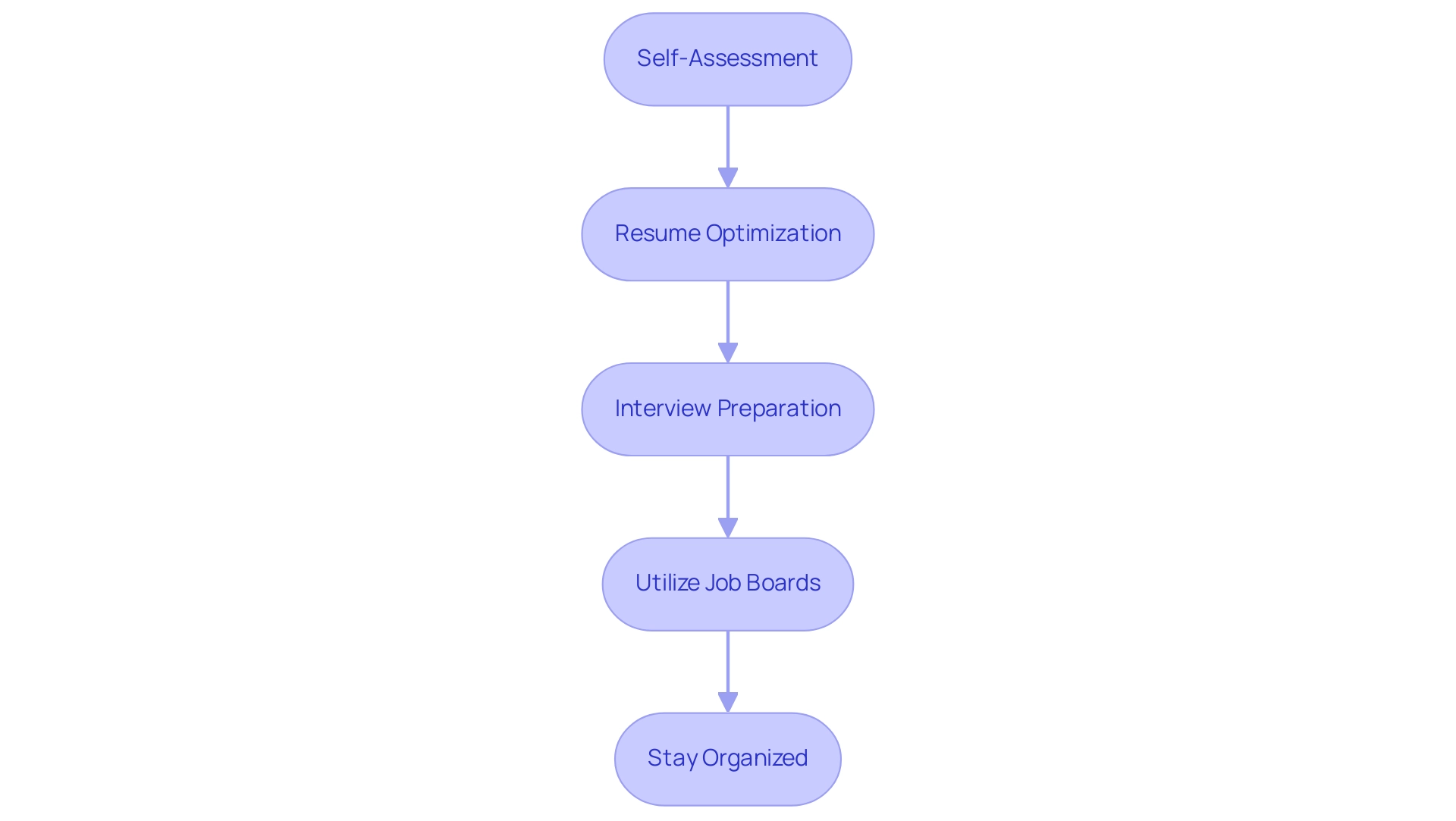
Continuous Learning: Staying Relevant in the Executive Job Market
To maintain a competitive edge as an executive job seeker in the job market, adopting effective continuous learning strategies is essential. Consider these approaches that can significantly influence your professional advancement:
-
Enroll in Courses: Pursuing courses that focus on emerging industry trends, such as artificial intelligence and digital transformation, is crucial. In 2025, statistics reveal that 67% of workers are influenced by opportunities to develop new skills when considering job changes, highlighting the necessity of staying updated. Furthermore, 94% of salespeople say they would stay at a company longer if it invested in their learning, underscoring the importance of continuous education as a retention strategy.
-
Attend Workshops: Engaging in workshops that enhance leadership skills and personal development can provide valuable insights and practical tools. These experiences not only foster growth but also align with the growing trend of organizations treating learning as a strategic advantage, as the future of learning shifts towards personalized, continuous, and seamlessly integrated experiences.
-
Join Professional Associations: Becoming a member of industry-specific groups can open doors to resources and networking opportunities. These associations often provide access to exclusive training sessions and events that can enhance your professional profile.
-
Read Widely: Keeping abreast of the latest literature—books, articles, and reports—related to your field is vital. This practice not only broadens your knowledge base but also equips you with the insights needed to navigate industry changes effectively.
-
Seek Mentorship: Establishing connections with mentors can be transformative. Mentors provide guidance and share experiences that can clarify your professional journey, assisting you in making informed choices about your development.
Integrating these strategies into your professional plan can significantly boost your relevance as an executive job seeker. A case study from 2025 indicates that 92% of employees believe that training goals should reinforce a positive employee experience, emphasizing the importance of aligning professional development with personal growth and workplace culture. By prioritizing continuous learning, an executive job seeker not only advances their career but also contributes to a thriving organizational environment.
As Eric Eddy noted, the firm’s ability to deliver top-notch candidates quickly and efficiently is a testament to the value of investing in learning and development.
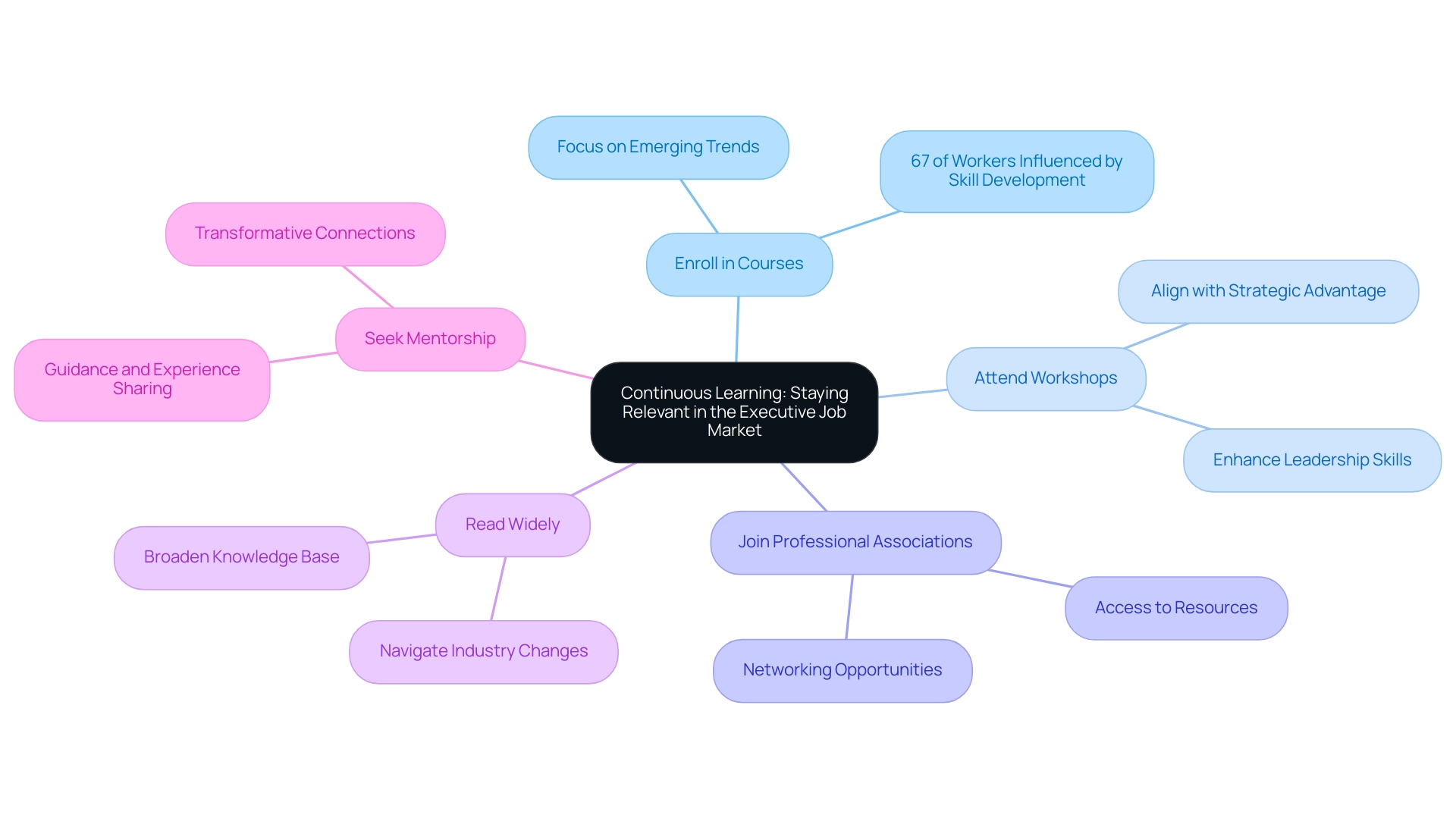
Maintaining Resilience: Navigating the Emotional Journey of Job Searching
To maintain resilience during your employment hunt and effectively evaluate job offers, consider implementing the following strategies:
-
Set Realistic Goals: Break your job search into manageable tasks. This approach not only helps in avoiding feelings of overwhelm but also allows you to track your progress effectively. Research indicates that setting specific, achievable goals can significantly enhance motivation and focus.
-
Explore Opportunities Thoroughly: Remember that the first job offer may not always be the best. It’s crucial to attend multiple interviews and challenge the initial offer with other possibilities. This exploration can uncover opportunities that align more closely with your professional ambitions and values, ultimately leading to a more fulfilling role. You may discover unexpected benefits, such as enhanced flexibility or growth potential, that can significantly impact your career trajectory.
-
Develop a Routine: Establishing a daily schedule is crucial. Allocate dedicated time for job searching, networking, and self-care activities. A structured routine can provide a sense of normalcy and purpose, which is particularly important in a competitive job market where the U.S. labor market continues to show resilience with steady job growth and low unemployment.
-
Practice Self-Care: Engage in activities that promote both mental and physical well-being. Regular exercise, mindfulness practices, and hobbies can help reduce stress and improve your overall outlook. Prioritizing self-care is essential, especially as 57% of CEOs rank retaining and engaging employees as a top business priority, highlighting the importance of well-being in the workplace.
-
Seek Support: Connecting with peers or joining support groups can provide valuable encouragement and insights. Sharing experiences with others in similar situations can foster a sense of community and reduce feelings of isolation during the job hunt process. Celebrate Small Wins: Acknowledge and celebrate your progress, no matter how small. Recognizing achievements, such as completing a networking call or submitting an application, can boost your motivation and reinforce a positive mindset.
-
Invest in Upskilling: Utilize online platforms like Coursera and job training programs like Merit America to enhance your skills and adapt to the evolving job market. Continuous learning and developing technical skills are crucial in an AI-driven workforce, ensuring you remain competitive and relevant. By integrating these strategies into your job search, you can enhance your resilience and maintain motivation, positioning yourself effectively as an executive job seeker in the evolving market of 2025. Remember, taking the time to evaluate each offer against your long-term aspirations can lead to more satisfying career choices. Avoid the trap of committing too quickly to an offer, as this can lead to regret; instead, consider all available options and the supportive nature of companies that value well-informed decisions.
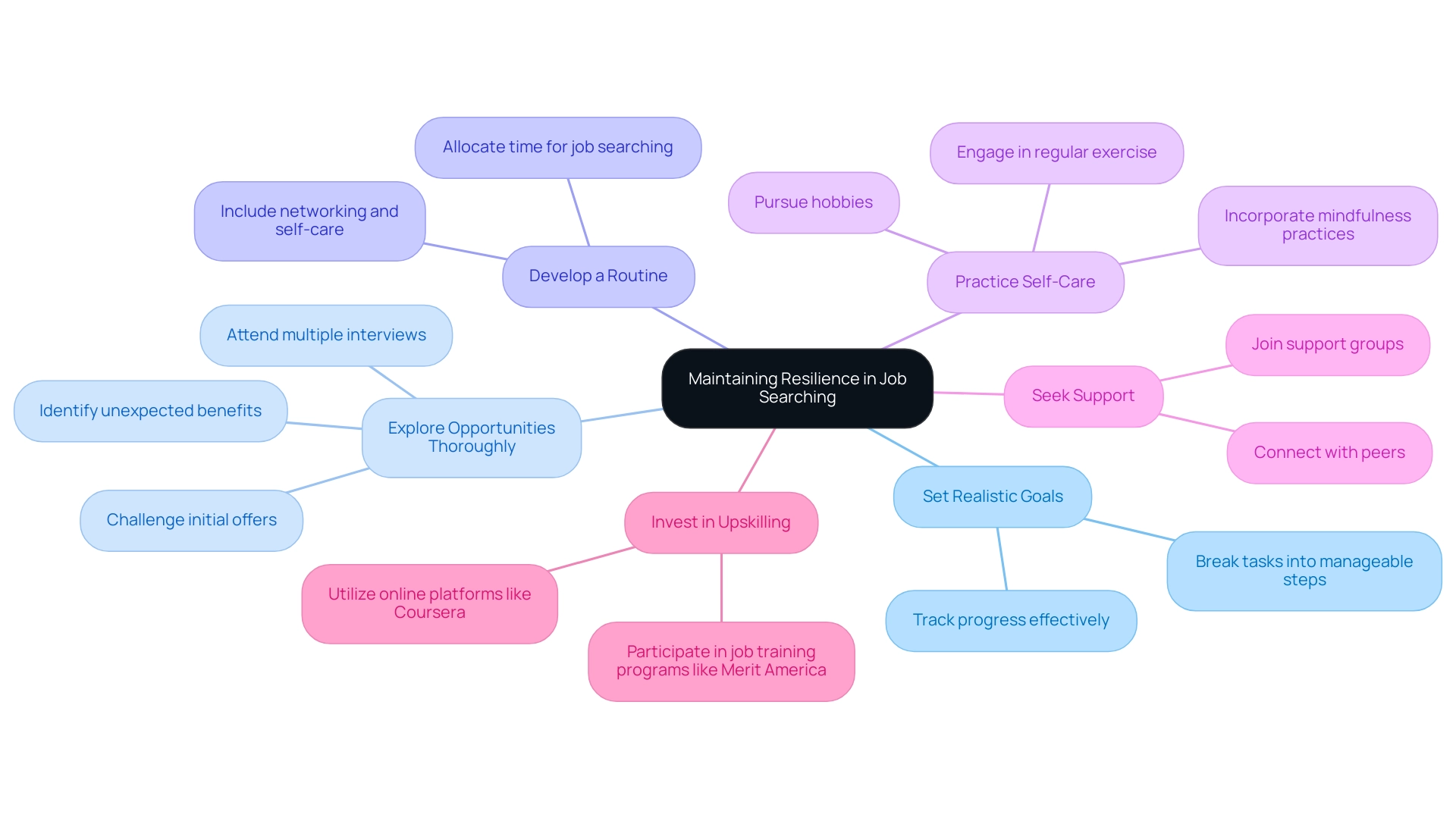
Conclusion
The executive job market in 2025 presents both challenges and opportunities for leaders seeking to advance their careers. Key trends such as digital transformation, remote work, diversity and inclusion, and salary transparency shape the landscape, requiring executives to be agile and strategic in their approach. Embracing technology and fostering inclusive environments are essential for attracting top talent and ensuring organizational success.
Personal branding and networking have emerged as critical components of a successful job search. By defining a unique value proposition and actively engaging with industry connections, executives can enhance their visibility and credibility in a competitive marketplace. Continuous learning and professional development further bolster an executive’s appeal, ensuring they remain relevant amidst rapid changes.
Navigating the complexities of executive search firms and understanding their value can significantly enhance job seekers’ prospects. Building strong relationships with recruiters and clearly articulating career goals are vital steps in this process. Moreover, maintaining resilience throughout the job search is crucial. Setting realistic goals and practicing self-care can keep candidates motivated and focused.
Ultimately, the key to thriving in the evolving executive job market lies in a proactive and strategic approach. By embracing continuous learning, leveraging networks, and prioritizing personal branding, executives can position themselves not just as contenders but as leaders shaping the future of their industries. As the landscape continues to shift, those who adapt and innovate will undoubtedly find themselves at the forefront of opportunity. Now is the time to take action—embrace these strategies and elevate your career to new heights.
Frequently Asked Questions
What are the key trends shaping the leadership job market in 2025?
The key trends include digital transformation, remote work, diversity and inclusion, and salary transparency.
How is digital transformation affecting leadership roles?
Digital transformation, driven by AI and automation, requires leaders to embrace these technologies to improve operational efficiency and innovation. Leaders must also guide initiatives focused on upskilling and ethical technology use.
What impact does remote work have on job opportunities for executives?
The shift towards hybrid work models emphasizes the importance of flexibility and work-life balance. Executives should evaluate job opportunities with these factors in mind, fostering collaboration across various work settings.
Why is diversity and inclusion important in leadership recruitment?
Organizations are increasingly seeking diverse leadership teams to enhance cultural competence and foster inclusive workplaces. Leaders are expected to champion diversity initiatives, which can attract high-quality candidates.
How should leaders approach salary negotiations in 2025?
Leaders must be prepared to negotiate effectively by understanding market rates and articulating their value proposition. Candidates should approach negotiations confidently, backed by data regarding their contributions.
What services can job seekers utilize to navigate the competitive job market?
Job seekers can benefit from personalized professional coaching, networking support, job placement assistance, expert application and interview preparation, and professional development skills.
How can professionals enhance their personal brand in the job market?
Professionals can enhance their personal brand by defining their unique value, optimizing their online presence, engaging in thought leadership, networking strategically, and seeking feedback from peers and mentors.
What role does personal branding play in career advancement?
Personal branding is crucial for visibility and appeal to potential employers. A strong personal brand can significantly impact a professional’s career trajectory and job opportunities.
How does a positive work environment affect personal branding?
A fun and engaging work environment can foster productivity and engagement, which positively influences personal branding efforts and attractiveness to prospective employers.